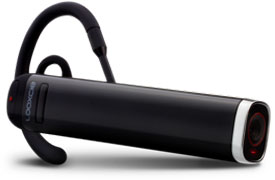
Researchers used a Looxcie camera such as this
one to record every moment in participants' lives for
automated editing and later playback.
One thing I’ve learned over the past few years is that my generation identifies a lot with the movie The Truman Show. None of us believe that our lives are actually being taped 24/7, of course. But it’s hard to ignore the fact that increasing amounts of our lives are, essentially, being monetized. There are people making money off tracking the location of your car, tracking your location inside of stores, and even peeking over your shoulder at the supermarket. And as part of our infatuation with modern technology, we gleefully give away this data for free.
Researchers at the University of Texas believe that our lives are only going to get less private moving forward. Between products like Google Glass and our own collective narcissism, personalized video experiences harvested from always-on cameras are likely to be a major future trend.
“The amount of what we call ‘egocentric’ video, which is video that is shot from the perspective of a person who is moving around, is about to explode,” explains Kristen Grauman of UT’s College of Natural Sciences. “We’re going to need better methods for summarizing and sifting through this data.”
As part of an experiment, UT scientists gave a number of study subjects a commercially available Looxcie wearable camera that captures 5 hours of video at a time, all from a first-person perspective. Recorded images were then processed through a computer for analysis, measuring when people were looking at an object and how long they maintained their attention. Short video clips are then combined to create story-like summaries of participants’ daily activities, not unlike a reality TV show.
Of course, the real goal of the UT team wasn’t just to make us all stars in our own TV series; it’s to help certain people and organizations with very specific needs. To that end, Grauman cites the value of the technology in wartime applications, in police investigations, and for those with Alzheimer’s-like memory deficits. Reviewing these clips can boost a person's recall, even for events not explicitly pictured.
Using this technology requires you to surrender a massive amount of privacy, even if it’s only being surrendered to a computer algorithm reviewing your day. But sooner or later, our own narcissism will get the best of us. After all, there are already life journal apps available (like Rove) that automatically track every move we make. Is adding video to a service like that such an impossible, unpopular step?
To learn more about the University of Texas’s research on personalized video, visit the college’s website.














